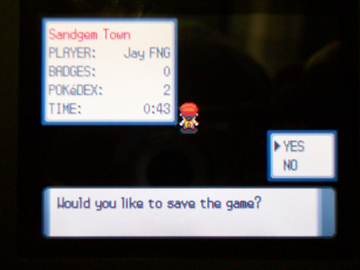This post has not been edited by the GamesBeat staff. Opinions by GamesBeat community writers do not necessarily reflect those of the staff.
Editor’s note: I’ve never been much of a PC gamer, so I don’t have quite as much love for the save-anywhere system as Rob. That said, the criticism that’s being levied upon Halo 3: ODST shows that consoles’ save systems often leave a lot to be desired. Also, Dead Rising has the worst save system in the history of the world. It’s true. – Aaron
 The ability to save progress in a video game has come a long way for consoles. In the PC realm, we’re pretty much had the most flexible save game system since the beginning — save anywhere, anytime, with virtually no limit on the number of saves allowed (referred to as “save-anywhere” onward.)
The ability to save progress in a video game has come a long way for consoles. In the PC realm, we’re pretty much had the most flexible save game system since the beginning — save anywhere, anytime, with virtually no limit on the number of saves allowed (referred to as “save-anywhere” onward.)
But, due to memory limitations, consoles have been forced to make use of unwieldy save systems like ridiculous passwords, internal batteries, and a very limited number of save slots (usually three). The introduction of memory cards was a step up and gave console players more flexibility for saving games but with the added annoyance of frequent card swapping for anyone with an average-sized game library.
For consoles, the PlayStation 3 is probably the most forward-looking solution for memory management by doing two things right — making the hard drive a standard feature in all models and allowing owners to upgrade memory easily and cheaply by using standard drives.
Furthermore, I’ve noticed that many PS3 games use a centralized saving system tied to the console rather than the game. This lets players to generate as many save files as their current memory capacity will allow. This is really no different than the way that PC games have been doing things for decades.
So I was surprised to find that while consoles are moving things forward in the memory department, some newer games are still hopelessly behind the times.
I first noticed this with Assassin’s Creed. The game only allows one save slot per account on the console. What the hell is that about? I have to create a whole new console account for every person in the household who wants to play the game? What nonsense.
I realize that this likely has to do with achievements and trophies, but you know what? Some of us just don’t care. All we want is the ability to management multiple save games without logging out.
I’m also not keen on the checkpoint system, either; a lot of games make use of checkpoints, like the aforementioned Assassin’s Creed and Resident Evil 5.
The problem with games that make use of checkpoints is that more often than not, the game relies solely on checkpoints as the save system. I’m perfectly fine with checkpoints in addition to the save-anywhere system, but checkpoints alone can be a real pain in the ass.
I like to play late at night, as this is usually when I have the largest block of uninterrupted free time to myself. Dragging on a playing session past two-or-three in the morning — not because I was overly engrossed in the game but because I was trying to finish a section in order to trigger a checkpoint save — just plain sucks.

I’m so… sleepy… curse you Capcom for forcing me to find a checkpoint!
At least Capcom dumped the typewriter save system with Resident Evil 5, which was as archaic as the location-based save system still used in Final Fantasy games, all the way up to the twelfth entry in the series.
Why do some developers insist on these types of completely inconvenient save systems despite the fact that consoles have finally caught up to PCs with memory and file management? Is there an argument to be made in favor of a more restrictive save system?
Perhaps. The original Alien vs. Predator PC game initially shipped without the traditional save-anywhere system and only saved the game at the end of each level. The backlash was so great that Rebellion issued a patch introducing save-anywhere. But there was something of value there, evidenced in Monolith’s inclusion of a “Hardcore” mode — which disallowed mid-mission saves — in the sequel.
Both the Alien vs. Predator games put heavy emphasis on creating a horrifying atmosphere. By being forced to play through an entire level without dying once, players were sucked into the terrorizing experience with tension-filled play sessions.
Another strike against save-anywhere is the ease of abuse that comes with such a system. Many PC first-person shooters use save-anywhere, and some players will religiously press the quick save key every few steps, thus guarantying a penalty-free play-through.
In X-COM: UFO Defense, some players would save their game during tactical missions after every turn, or even after every action, which would allow them to undo any mistake or prevent the death of any soldier.
While I recognize the concerns of the latter and the potential benefits of the former, at the heart of each of these is contempt for the player. In a single-player game, why care about how someone will choose to play?
If some people want to be able to save every solider from death in X-COM, so be it. If some players want to quick save after every enemy encounter, I say let them. Why? Because I want the ability to save my progress and stop playing the game whenever I choose, as well as the ability to decide how difficult I want to make the game on myself.

Finally!
That’s what makes the save-anywhere system perfect — it puts control over the experience in the player’s hands. If I want to attempt completing a level without dying once, I can set my own personal limitations (or if I haven’t the willpower, I can make the decision to let the developers set save rules by opting to play in a “Hardcore” mode.)
And with save-anywhere, I will no longer be forced to stay up late, hunting for a checkpoint or a save location. I can finish a play session when I decide the game is over.
By and large, PC games understand this and have almost always provided a save-anywhere system. Console games have just gotten access to the memory required to support a save-anywhere system during this generation, but so many newer titles still use restrictive save systems. What gives?
